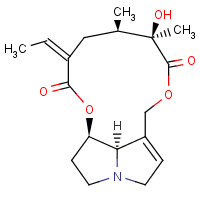Senecionine
Agent Name
Senecionine
CAS Number
130-01-8
Formula
C18-H25-N-O5
Major Category
Biological Agents

Synonyms
12-Hydroxysenecionan-11,16-dione; Aureine; Senecionan-11,16-dione, 12-hydroxy-; Senecionin; (1,6)Dioxacyclododecino(2,3,4-gh)pyrrolizine-2,7-dione, 3-ethylidene-3,4,5,6,9,11,13,14,14a,14b-decahydro-6-hydroxy-5,6-dimethyl-, (3Z,5R,6R,14aR,14bR)-; [ChemIDplus]
Category
Plant Toxins
Description
Solid; [Merck Index] White powder; [MSDSonline]
Sources/Uses
Hepatotoxic alkaloid from plants of the Senecio species; [Merck Index] Used as a folk remedy (uterine stimulant and treatment of diabetes mellitus, hemorrhage, and high blood pressure); [HSDB]
Comments
Emergency treatment: "Plants- pyrrolizidine alkaloids"; Pyrrolizidine alkaloids (PAs) cause veno-occlusive liver disease. Diagnosis is difficult because symptoms may be delayed for days or weeks. After drinking herbal tea or eating plants contaminated with seeds of PA plants, symptoms may include vomiting, abdominal pain, hepatomegaly, and later cirrhosis and ascites. Jaundice may be present. Children may appear to have Reye's syndrome. [HSDB] Teas containing PAs include coltsfoot, comfrey, gordolobo, groundsel, mate, tansy ragwort, and T'u-san-chi. The teas may be prescribed as herbal remedies for anxiety or amenorrhea. The alkaloid is concentrated in the root of the plants. As little as 85 mg may be toxic. [Haddad, p. 1082]
Biomedical References
Adverse Effects
Hepatotoxin
Hepatoxic (a) from occupational exposure (secondary effect) or (b) in animal studies or in humans after ingestion
Diseases, Processes, and Activities Linked to This Agent
Other Information
No other related information on this agent was found.